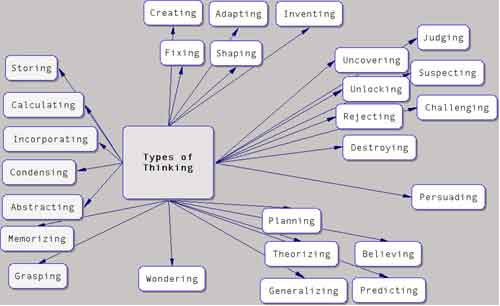- Nexus?
1 [noun] the means of connection between things linked in series
Synonyms: link
2 [noun] a connected series or group
WordWeb dictionary
-
For two decades, schools have brought new technologies into classrooms without fully appreciating the importance of literacies and comprehension as the driving forces that could make their investments pay off in the form of enhanced student performance. In many cases, schools fell into the trap of doing technology for the sake of technology.
This article explores the promising connections between technologies, literacies and comprehension as ways of equipping students to manage challenging tests such as NAEP (The National Assessment of Educational Progress) as well as the even more important tests of life.
NAEP - The Toughest Tests in the Land
NAEP (The National Assessment of Educational Progress) has been around for decades, but it was not until the advent of NCLB that states were required to submit a sample of students to its scrutiny. It has always been a challenging collection of tests with a minority of students achieving proficiency levels, but it acts as a powerful standard against which to measure the validity of state proficiency claims. Some of the states claiming miraculous progress are shown by NAEP to be frauds.
What makes NAEP so tough?
- Items require inference, analysis, synthesis and evaluation.
- Students must generate open-ended responses instead of picking from a list of multiple choice items.
- Success on NAEP depends upon thinking - the ability to make up your mind and figure things out.
- Memorized patterns don't cut it.
Sadly, NCLB offers many loopholes so that some states can make their students look good on state tests without them actually doing well. The NAEP tests hold all states accountable in a way that closes the loopholes.
When we look below at the huge gaps in some states between claims of student proficiency and actual proficiency as measured by NAEP, it is quite clear which states have the biggest gaps.
Proficiency requires thinkers - not automatons.
    
What is a thinker?
And how could students spend lots of time in school doing thinking without ever becoming thinkers?
A thinker is someone capable of generating fresh ideas, building insight, making inventions and figuring out how to confront problems. A thinker does not rely only on conventional wisdom and is rarely content to cut and paste the thinking of others. In the diagram below, the thinker spends lots of time doing the kinds of thinking on the right but many students spend most of their time on the list on the left, storing, calculating, incorporating, condensing, abstracting, memorizing and grasping. Many school rituals require little real thought.

Research Rituals
A student can spend weeks studying an important person from history or literature without actually doing any important thinking, yet it might seem to the casual observer that the student has been thinking long and hard.
Remedy: Questions of Import
- In what ways was the life remarkable?
- In what ways was the life despicable?
- In what ways was the life admirable?
- What human qualities were most influential in shaping the way this person lived and influenced his or her times?
- Which quality or trait proved most troubling and difficult?
- Which quality or trait was most beneficial?
You will find an expanded version of the list above at The Biography Maker - http://fno.org/bio/biomaker.htm
Avoiding Another Brick in the Wall
- We don't need no education.
- We don't need no thought control.
Thinkers do more than smush!
Collecting and smushing lots of information is a type of synthesis.
But we should expect more of our students.
How do composition, comprehension, inquiry and communication relate?
The remainder of this article is continued at http://questioning.org/nov05/puzzling.html and at http://fno.org/dec05/writing.html.
Credits: The photographs in this article were shot by Jamie McKenzie.
Copyright Policy: Materials published in From Now On may be duplicated in hard copy format if unchanged in format and content for educational, nonprofit school district and university use only and may also be sent from person to person by e-mail. This copyright statement must be included. All other uses, transmissions and duplications are prohibited unless permission is granted expressly. Showing these pages remotely through frames is not permitted. FNO is applying for formal copyright registration for articles. Unauthorized abridgements are prohibited.
|